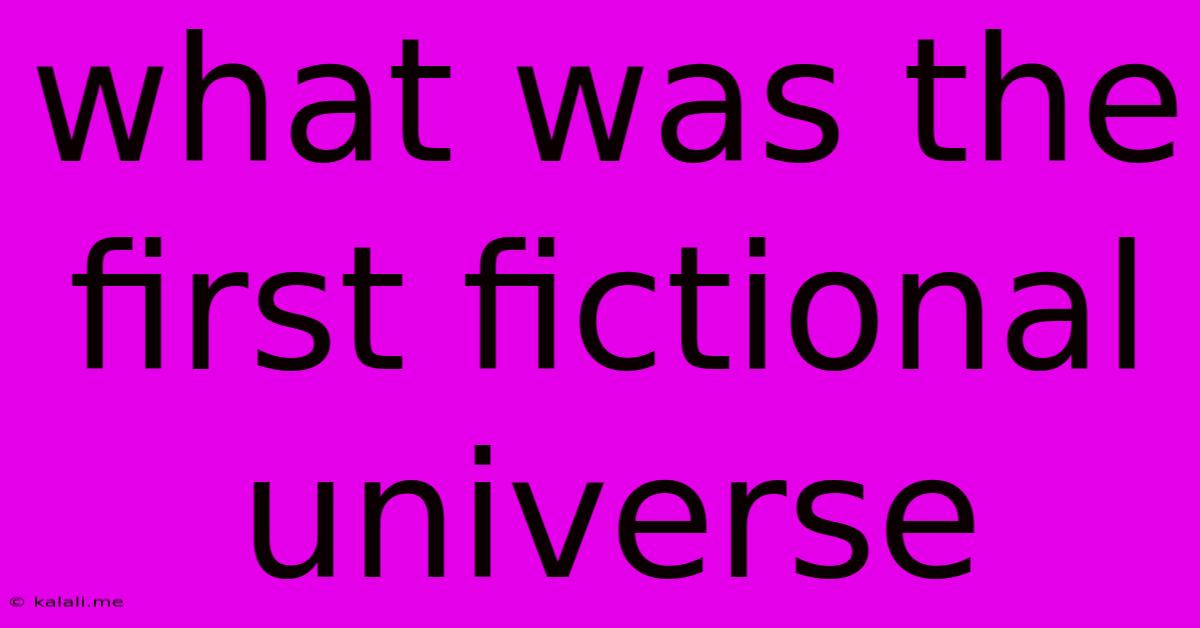What Was The First Fictional Universe
Kalali
Jun 06, 2025 · 3 min read

Table of Contents
What Was the First Fictional Universe? Defining "Universe" and Tracing Literary Worlds
Defining the very first fictional universe is a surprisingly complex task. It hinges on how we define "universe." Is it a fully realized world with consistent internal logic, intricate details, and recurring characters, or does it simply require a setting beyond our own reality? This article explores various contenders for the title, highlighting the challenges of pinpointing an absolute "first" and examining the evolution of fictional world-building.
Meta Description: Uncover the fascinating history of fictional universes! This article delves into the debate surrounding the first fictional world, exploring early examples and the evolution of world-building in literature. Discover which contenders might claim the coveted title.
The Challenges of Defining "First"
Pinpointing the very first fictional universe is difficult for several reasons:
- Oral Traditions: Many early stories existed solely as oral traditions, making it impossible to definitively date or attribute authorship. Myths and legends from various cultures, while not explicitly "universes" in the modern sense, laid the groundwork for complex fictional worlds.
- Evolution of Narrative: The concept of a fully realized fictional universe, complete with its own internal rules and history, developed gradually. Early narratives often focused on singular plots, with less emphasis on world-building.
- Subjectivity of Criteria: Defining what constitutes a "universe" is subjective. Some might argue for a fully fleshed-out world with detailed geography, political systems, and diverse cultures. Others might include works with a more limited scope but still distinct from our reality.
Early Contenders and the Evolution of Worldbuilding
While a definitive answer remains elusive, several works stand out as early examples of fictional world-building:
-
Epic Poems: Ancient epics like the Epic of Gilgamesh (Mesopotamia) and the Mahabharata and Ramayana (India) feature expansive narratives with fantastical elements, diverse characters, and intricate plots set within distinct geographical and cultural contexts. While not consistently defined universes in the modern sense, these narratives laid the groundwork for creating vast fictional settings.
-
Classical Literature: Greek and Roman myths and legends populated richly imagined worlds, featuring gods, monsters, and heroes. Works like The Odyssey and The Aeneid, with their detailed descriptions of journeys across seas and encounters with mythical creatures, demonstrate early forms of world-building. However, these narratives often integrated mythical elements into a recognizably familiar world, blurring the lines between reality and fiction.
The Rise of the Modern Fictional Universe
The concept of a self-contained, internally consistent fictional universe really took off in the 19th and 20th centuries, with works like:
- Early Science Fiction: Authors like Jules Verne and H.G. Wells created narratives set in meticulously detailed, if often fantastical, future worlds. These narratives significantly advanced the idea of building complete and consistent fictional worlds.
- Fantasy Literature: J.R.R. Tolkien's The Lord of the Rings is frequently cited as a pivotal work in the development of modern fantasy universes. His meticulous world-building, encompassing detailed languages, histories, and cultures, established a new standard for depth and consistency.
Conclusion: A Continuous Evolution
Ultimately, there's no single answer to the question of the first fictional universe. The concept evolved gradually, with early narratives laying the groundwork for the richly detailed worlds we encounter today. The works mentioned above represent significant milestones in this evolution, showcasing the continuous refinement of fictional world-building techniques throughout literary history. The ongoing exploration of this topic reflects the enduring human fascination with creating and exploring imaginative realms beyond our own.
Latest Posts
Latest Posts
-
The Impact The Character Has Vs Appearance
Jun 07, 2025
-
How To Get Rid Of Rats In My Yard
Jun 07, 2025
-
Can I Back Feed Electricity From Generator
Jun 07, 2025
-
Is Gluten Free Kosher For Passover
Jun 07, 2025
-
How To Prevent Dogs From Digging In Yard
Jun 07, 2025
Related Post
Thank you for visiting our website which covers about What Was The First Fictional Universe . We hope the information provided has been useful to you. Feel free to contact us if you have any questions or need further assistance. See you next time and don't miss to bookmark.